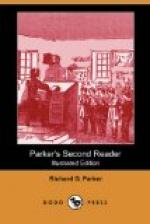3. Having taught you how to read hard words, I propose, in this lesson, to give you a few long words to read,—not for the purpose of understanding what they mean, but only to make you able to read such words, when you find them in any other book.
4. The best way of getting rid of all difficulties, is to learn how to overcome them, and master them; for they cease to be difficulties, when you have overcome them.
5. Demos’thenes, as I told you in the last lesson, had a very hard task to perform, before he became a great orator. You, also, can become a good scholar, if you will take pains to study your lessons, and learn them well.
6. Before you read any lesson to your teacher from this book, it is expected that you will study it over, and find out all the most difficult words, so that you may read them right off to him, without stopping to find them out, while he is waiting to hear you read them.
7. Now, here I shall place a few hard words for you to study over, to read to your teacher when you read this lesson to him; and he will probably require every one in your class to read them all aloud to him.
8. I wish you not to go up to your teacher to ask him to assist you, until you have tried yourself to read them, and find that you cannot.
9. There are some words that are not pronounced as they are spelt, as I have taught you in a former lesson.
10. Such a word as phthisic, which is pronounced as if it were spelled tis’ic, I dare say would puzzle you, if you had never seen it before; but before you go up to your teacher, to ask him any questions, you should read over the whole of your lesson, and perhaps you will find, in the lesson itself, something that will explain what puzzled you; and thus you could find it out from your book, without troubling your teacher.
11. Here are some of the long words I wish you to read.
12. Organization, Theoretical, Metaphysical, Metempsychosis, Multitudinous, Arithmetician, Metaphysician, Hyperbolical.
13. Apotheosis, Indefeasible, Feasibility, Supersaturated, Prolongation, Meridional, Ferruginous, Fastidiousness.
14. Haberdashery, Fuliginous, Exhalation, Prematurely, Depreciation, Appreciability, Resuscitate, Surreptitious, Interlocutory.
15. Sometimes the letters a e, and o e, are printed together, like one letter, as in the words Caesar, Coelebs, and then the syllable is pronounced as if it were spelled with e alone, as in the following words:
16. Diaeresis, Aphaeresis, OEcumenical, AEthiop, Subpoena, Encyclopaedia, Phoenix, Phoebus, AEolus.
17. When there are two little dots over one of the letters, they are both to be sounded, as in the word Aerial, which is pronounced a-e-ri-al.
18. The letter c is one which puzzles many young persons who are learning to read, because it is sometimes pronounced like k, as in the word can, and sometimes like s, as in the word cent; and they do not know when to pronounce it like k, and when to sound it like s.




